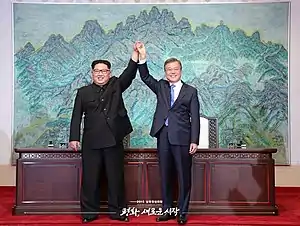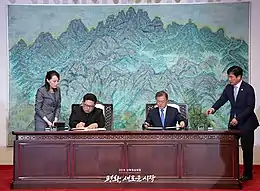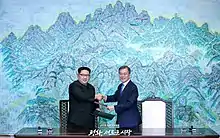Panmunjom Declaration
The Panmunjom Declaration for Peace, Prosperity and Reunification of the Korean Peninsula was adopted between the Supreme Leader of North Korea, Kim Jong-un, and the President of South Korea, Moon Jae-in, on 27 April 2018, during the 2018 inter-Korean Summit on the South Korean side of the Peace House in the Joint Security Area.
| Panmunjom Declaration for Peace, Prosperity and Reunification of the Korean Peninsula | |
|---|---|
 Moon Jae-in and Kim Jong-un raise their hands together after signing the Panmunjom Declaration | |
| Type | Declaration |
| Signed | 27 April 2018 |
| Location | P'anmunjŏm, Korea |
| Signatories | |
| Parties | |
| Language | Korean |
| Panmunjom Declaration | |||||||
|---|---|---|---|---|---|---|---|
| South Korean name | |||||||
| Hangul | 한반도의 평화와 번영, 통일을 위한 판문점 선언 | ||||||
| Hanja | 韓半島의 平和와 繁榮, 統一을 爲한 板門店 宣言 | ||||||
| |||||||
| North Korean name | |||||||
| Chosŏn'gŭl | 조선반도의 평화와 번영, 통일을 위한 판문점 선언 | ||||||
| Hancha | 朝鮮半島의 平和와 繁榮, 統一을 爲한 板門店 宣言 | ||||||
| |||||||
According to the declaration, the governments of North Korea and South Korea agreed to cooperate on officially ending the Korean War and the Korean conflict, beginning a new era of peace and sharing commitments in ending divisions and confrontation by approaching a new era of national reconciliation, peace, reunification and prosperity and improvements to inter-Korean communication and relations.[1]
This declaration states that both sides would "make active efforts to seek the support and cooperation of the international community for the denuclearization of the Korean peninsula".[2][3] The declaration was submitted to the United Nations General Assembly on 6 September 2018.[2]
Summary


- A full translation of the text of the Panmunjom Declaration can be found in Wikisource. Below is a summary of the declaration.
During this momentous period of historical transformation on the Korean Peninsula, reflecting the enduring aspiration of the Korean people for peace, prosperity, and reunification, President Moon Jae-in of the Republic of Korea and Chairman Kim Jong-un of the State Affairs Commission of the Democratic People's Republic of Korea held an Inter-Korean Summit Meeting at the 'Peace House' at Panmunjom on April 27, 2018.[4]
The two leaders solemnly declared before the 80 million Korean people and the whole world that there will be no more war in Korea and thus a new era of peace has begun.
1. Promote common prosperity and reunification of Korea through dramatic improvement and development of inter-Korean relations
- Continue high-level working-level talks for the full implementation of the agreement
- Establishment of Joint Liaison Office in Gaeseong between South and North Korea
- Multilateral cooperation and exchange
- Inter-Korean Red Cross talks and reunions of separated families on 15 August 2018
- Connecting and modernizing roads with Donghae and Gyeongui railways
2. Elimination of military tension and substantial elimination of war risk
- Cease all hostile acts
- Designed as a peace zone in the western part of the west coast
- Establishment of military mutual guarantee measures through high-rank military-level talks
3. Establishing a permanent and peaceful Korean peninsula peace regime
- Inviolable agreement
- Stepwise disarmament
- In celebration of the 65th anniversary of the Korean Armistice Agreement in 2018, South and North Korea cooperate closely with the US and China to establish a peace treaty on the Korean peninsula after ending the 1953 Korean War.
- Finalise the complete denuclearization of the Korean peninsula
The two leaders agreed, through regular meetings and direct telephone conversations, to hold frequent and candid discussions on issues vital to the nation, to strengthen mutual trust and to jointly endeavor to strengthen the positive momentum towards continuous advancement of inter-Korean relations as well as peace, prosperity and reunification of the Korean Peninsula.
In this context, President Moon Jae-in agreed to visit Pyongyang in the fall of 2018.
April 27, 2018Done in Panmunjom(signed) Moon Jae-in, President, The Republic of Korea(signed) Kim Jong-un, Chairman, State Affairs Commission, The Democratic People's Republic of Korea
See also
References
- "Panmunjom Declaration: The key points | Dhaka Tribune". Dhaka Tribune. 27 April 2018. Retrieved 28 April 2018.
- "Panmunjom Declaration for Peace, Prosperity and Unification of the Korean Peninsula". South Korea: Ministry of Foreign Affairs. 11 September 2018. Retrieved 15 September 2019.
- Fifield, Anna (27 April 2018). "In a feel-good Korea summit, Kim lays the groundwork for meeting with Trump". Washington Post. Retrieved 28 April 2018.
- Japantimes.co.jp – Panmunjom Declaration 26 June 2018: Full text of Panmunjom Declaration